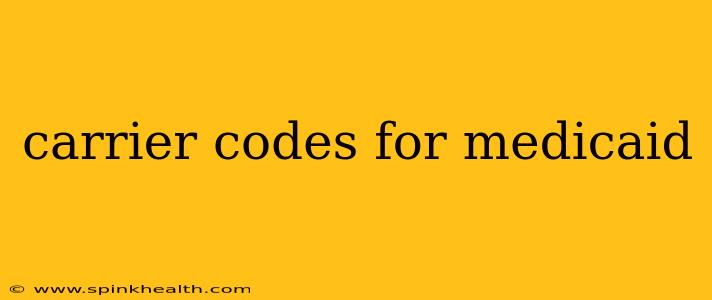Decoding the Mystery: Understanding Medicaid Carrier Codes
The world of healthcare billing can feel like navigating a maze, especially when dealing with Medicaid. One of the trickiest aspects is understanding carrier codes. These aren't just random numbers; they're crucial for ensuring your claims are processed correctly and you receive payment. Let's unravel the mystery behind Medicaid carrier codes and make the process a little clearer.
Imagine you're a healthcare provider submitting a claim for a patient covered by Medicaid. You need to know exactly who to send the claim to. This is where the carrier code comes into play. It's like a postal code, but instead of directing your letter to a street address, it directs your claim to the specific Medicaid agency or payer responsible for processing it.
What are Medicaid Carrier Codes?
Medicaid carrier codes are unique identifiers assigned to the various state Medicaid agencies and managed care organizations (MCOs) that administer the Medicaid program. Each state's Medicaid program operates independently, resulting in a unique carrier code for each state and often for different regions or MCOs within a single state. These codes are essential because they tell the billing system exactly where to send the claim for processing. Without the correct carrier code, your claim may be rejected, causing delays in payment.
How do I find the correct Medicaid Carrier Code?
This is the million-dollar question! Unfortunately, there isn't one single, universally accessible database. The process often requires a bit of detective work. Here's a breakdown of how you can find the correct carrier code:
-
Your Patient's Medicaid Card: The most straightforward method. Some Medicaid cards may include the carrier code directly. It might be labeled as a "payer ID," "carrier ID," or something similar. Look carefully at all the information printed on the card.
-
The Patient's Explanation of Benefits (EOB): If the patient has received services before, their EOB should clearly state the payer and their specific carrier code.
-
The Medicaid Agency's Website: Each state Medicaid agency has its own website. You might find provider manuals, directories, or contact information to help you determine the correct carrier code for a specific region or MCO.
-
Your Billing Software: Many billing software programs contain comprehensive payer directories. You can enter the patient's information and the software should automatically identify the correct carrier code.
-
Directly Contacting the Medicaid Agency: If all else fails, contacting the state Medicaid agency directly is your best bet. Their provider services department can guide you to the appropriate carrier code for the patient's coverage.
Why is the correct Carrier Code so Important?
Using the wrong carrier code leads to significant problems:
-
Claim Rejection: This is the most common consequence. The claim won't be processed because it's sent to the wrong location.
-
Delayed Payments: Even if the claim isn't rejected outright, it can be significantly delayed while it's routed to the correct payer.
-
Administrative Headaches: Correcting incorrect carrier code submissions can consume valuable time and resources.
-
Potential Penalties: In some cases, consistently submitting claims with the wrong carrier code can result in penalties from the Medicaid agency.
What about Managed Care Organizations (MCOs)?
Many states utilize managed care organizations (MCOs) to manage a portion of their Medicaid benefits. If your patient is enrolled in an MCO, you'll need the carrier code specific to that MCO, not just the general state Medicaid agency code.
Are there any resources to help me find Medicaid Carrier Codes?
While a centralized database doesn't exist, many states provide provider resources on their Medicaid websites. Consulting your state’s Medicaid website is your best starting point. Additionally, professional billing organizations often offer resources and training on Medicaid billing and carrier codes.
Navigating Medicaid carrier codes can be challenging, but by following these steps and utilizing available resources, you can significantly improve the efficiency and accuracy of your claims processing. Remember, accurate information is key to timely reimbursement and maintaining a smooth relationship with the Medicaid program.

